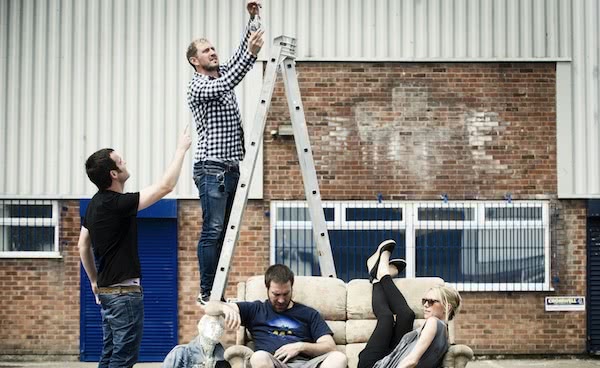Chatting to Andrew ‘Falco’ Falkous, frontman for angular Welsh alt-rockers Future Of The Left, makes you instantly feel like you’re in a tiny Cardiff pub, downing a pint and watching a football game. Falco is known (and occasionally lambasted) for being brutally honest, and in a saccharine industry of product placement and the two-week record cycle, maybe his down-to-earth nature is just jarring. Or maybe, if you remember what it’s like to have a human conversation, he’s a breath of fresh air.
It’s virtually impossible to keep him focused on business questions – current tours, this year’s album How To Stop Your Brain In An Accident, press release regurgitation– but the guy’s got plenty to say.
For a moment he talks shop, discussing the band’s recent British tour and their plot to return to the US sometime soon. “It’s quite difficult to the get to America, but a band of our size can usually find a way to get over there and not lose money,” Falco says. “That’s always the insane dream anyway. It’s just an incredible experience overall, so even if it’s just a month a year, the experience of the States is a wonderful thing. Other than that, I’ve just been fuckin workin’, I’ve been disappointed but enriched by the cricket, drinkin’, runnin’, injuring myself running, having a toothache – the usual things.”
After a successful crowdfunding campaign, FOTL released How To Stop Your Brain In An Accident in October to an eager audience. Measuring the album’s success so far is something that Falco finds a strange process. “It’s hard, in a way. A person, unless they’re a close friend or someone whose views you value intensely – well, it’s sad to say their opinions aren’t really that important. But I guess album reviews have been good, even though the influence of album reviews [has lessened] compared to 20 years ago when that was a big gateway for a band and how much they’d get listened to – I guess they have some influence. On that basis, and on the basis of the audience response, it’s gone fairly well. Most people liked it, but then there are people out there that just don’t fucking like things. You ask them why and they’re like, ‘I just don’t.’”
Is this a criticism on the state of keyboard activism, Reddit-style hatefests and internet communication in general? “Absolutely, but the problem with criticising the internet in any way, or the morals of the internet, is that instantly – even with a fully functioning brain – it makes you sound like an 85-year-old man who’s just retired from 70 years as a weaver. But yeah, I’m 38 years old and much of the internet flowered on the heels of my generation, and the people who drive the internet are teenagers, basically. The people who follow the teenagers are those desperate people who desperately want to appear relevant … Something I find really interesting in all of this is how aggressive some fans can be of bands whose music isn’t aggressive at all. Some of the most aggressive people I’ve ever met are Stone Roses fans. Why is that? Why does ‘After all she’s a waterfall’ translate to ‘I’m gonna fuck you up mate’? Yet a bunch of guys who listen to death metal somehow translates to them in a circle pit going, ‘Oh I’m sorry, did I get in your way?’ It’s really bizarre. It’s strange how people’s entertainment choices don’t represent who they are. So often in life the correlations are clear, but not always. I guess there are exceptions – I’ve never been headbutted by a Keane fan. But of course our fans are just lovely.”
With a growing following, though, often comes an increasing disconnect between artist and audience – but Falco says the relationship is more complicated than that, especially in the live environment. “There’s sometimes a lot of entitlement in music and art, and bands shouldn’t expect anything from their fans – and I use this term with the greatest respect just because if someone called me a ‘fan’ of something I’d punch them; it’s not the power position in that relationship, let’s face it. And all a fan can expect from a band is the record a band wants to make. A record should be, for better or worse, a work of art. A live show is a different thing; a live show, for me, is entertainment. You go up there and play the hits and make them more interesting – it’s an hour-and-a-half assault where you’ll hopefully leave people bewildered.”
Still, the Australian audience occasionally leaves Falco bewildered himself. “Australian crowds can go either way,” he says. “Some of the best shows I’ve ever had have been in Oz, but we’ve also had some of the most weirdly cantankerous. My theory – well, our theory – is that if you go onstage too late on a weekend night in Australia, people are too drunk. Not every fucker in the room, but the kind of people that shout shit out are too drunk. It’s very easy to get an Australian crowd onside – wherever you are, you say that place name and say they’re a bunch of c*nts there and everyone cheers. That’s really nice but that doesn’t work anywhere else. It really didn’t work in LA.”
BY KRISSI WEISS
Future Of The Left play the Factory Theatre on Friday January 3, with support from Super Best Friends.How To Stop Your Brain In An Accidentout now through Prescriptions/Remote Control.


































